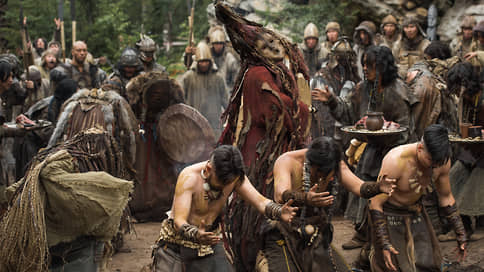The last argument of the princes – Newspaper Kommersant No. 184 (7385) dated 10/05/2022
[ad_1]

The historical drama “The Heart of Parma” by Anton Megerdichev is being released. It took a long time for this large-scale project to reach the big screen, and during this time it was filled with unexpected relevance, which, perhaps, the authors did not initially lay down, but which cannot be brushed aside. Tells Yulia Shagelman.
The novel by Alexei Ivanov, a native of Perm and a Ural patriot, was first published in 2003 and became popular almost immediately, despite the fact that he did not make any discounts for the reader. From its pages splashed out a loud mess of historical facts that school textbooks usually skim through, presented with a deep knowledge of ethnographic details, unfamiliar, strange-sounding words from different, including extinct, languages, as well as fantasy elements, balancing on a fine line, where Orthodoxy meets ancient pagan cults. However, from all this sprouted an exciting, cinematically convex plot with blood, love, curses, miracles and battles – no worse than some George Martin, and at the same time infinitely closer, because it was about the realities of their own, Russian history. And about topics that are relevant in the 21st century, almost more than in the 15th century: about an empire that grows like a cancerous tumor, about colonization, completely absorbing foreign culture, about the price that one has to pay for greatness and freedom—and that these concepts do not always mean the same thing.
This is excellent material for a film adaptation, and the first step towards it was taken back in 2005, when the rights to it were acquired by Central Partnership. Later they moved to another studio, the film was supposed to be directed by Sergei Bodrov, but he refused this role and is now listed as one of the three screenwriters. He was replaced by Anton Megerdichev, director of the nationwide hit “Move Up” (2017), in the new film convincingly proving that he is able to cope not only with sports battles, but also with real, bloody and scary ones.
Furious scenes of battles – from the ruin of the capital of the first Perm prince Yermolai (Alexander Gorbatov) by the Voguls (the old name of the Mansi) led by Khan Asyka (Valentin Tszyn), driving around on a fighting elk, to the almost forty-minute final battle in which Yermolai’s son Mikhail (Alexander Kuznetsov ) leads his army against Moscow in the last desperate attempt to defend the independence of Parma – turned out to be the most spectacular in the film. Alas, separating these two events for almost 20 years, which Permians lived in relative autonomy from the “federal center”, under the rule of Prince Mikhail, who prefers diplomacy and peaceful coexistence to forceful methods, when transferring the text to the screen, they turned out to be finely chopped, often to the detriment of the logic and depth of the narrative . The love line of Mikhail and the walker Tiche (Elena Erbakova), a witch possessed by the spirit of the mother goddess Sorni Nai, looks quite schematic. As is often the case in domestic blockbuster production, it was planned to make a full-length film and a TV series from the Heart of Parma at the same time – as a result, the entire second act of the picture seems to consist of fragments of separate series that end before they even begin.
At the same time, even more sharply than in the book, where many pages are devoted to reflections on the dualism of large historical processes, the boundaries of good and evil have been outlined in the film. On the Moscow side, which does not understand any language other than fire and sword, there is not a single positive character. It is represented by the fanatical Bishop Jonah (Evgeny Mironov), whose devout faith has not gone as far from paganism as he himself thinks; the treacherous clerk-drunkard (Mikhail Evlanov), despised even by his own superiors; cruel governor Fyodor Motley (Vitaly Kishchenko) and, finally, Grand Duke Ivan III himself (Fyodor Bondarchuk). Appearing on the screen almost to the end of the picture, he sets out the geopolitical doctrine of a single and indivisible Third Rome, endowed with spiritual power, and in response he hears from the Perm prince: “You have one hand in blood, and the other is in someone else’s pocket.” Unlike other modern rulers, Ivan Vasilyevich does not even deny this: he considers this state of affairs to be normal and intends to continue in the same spirit.
In its greed, Moscow upsets the established balance of power in the region, forcing Prince Mikhail to embark on a suicidal campaign against the Voguls. He wins not without the help of supernatural forces (the spirits of Parma are on the side of the pagans, the miraculous cross is on his side), but he loses most of his squad and turns out to be defenseless when the Muscovites fall upon him with all their might and advanced military technologies at that time. The outcome of this confrontation is predictable, but the moral victory remains with Mikhail. By today’s times, this is an event.
[ad_2]
Source link






